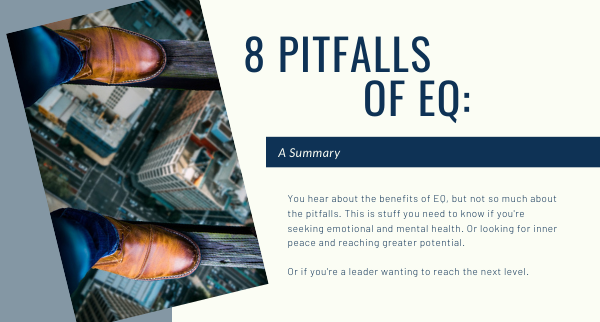The downside of higher EQ isn’t well known, yet those pitfalls can keep you off-balance without understanding why. Emotions have a profound effect on our lives. The more we educate ourselves on them, the more empowered we become and the better able to create inner peace and freedom.
I wrote a series of articles on the pitfalls of emotional intelligence. In this article, I’m summarizing the 8 potential pitfalls of emotional intelligence from those articles:
1. Better suited to followers than leaders.
EQ is often touted for leaders, yet research suggests it may be better suited to followers.
It can be a hindrance for leaders.
EQ makes you good at following rules and procedures. It can help with relationship building and teamwork.
But you can become too cued into the feelings of others. You (consciously and unconsciously) may start to avoid any actions and conversations that you think might cause people discomfort or stress.
You can become deficient in the nonconformity and unconventionality you need to challenge the status quo.
That can impede your ability as a leader to drive change, make unpopular decisions for the good of the company, and provide critical feedback. It can even increase the likelihood of you agreeing to situations that are morally questionable.
2. EQ leads to lower levels of creativity and innovation.
High EQ and creativity and innovation appear to be at odds; research has found a correlation between higher emotional intelligence and lower levels of creativity and innovation.
That’s a concern for today’s organizations as leaders have identified innovation as one of the most needed capacities.
3. EQ is too mental.
EQ is an intellectual response to something that isn’t mental.
The result? It often becomes about controlling our feelings, rather than resolving and integrating them.
It seems rational because we’ve been taught our left brains should dominate our right.
There’s a big downside: when approaching emotions from the intellect, it’s easy to think you know them while actually being disconnected from them.
Plus when we pit left brain against right, we create a battleground of our inner space.
It’s time to throw out the brain as battlefield view.
It’s time for models that increase peace and coherence.
4. Workplace Bullying Victims Have High EQ.
This one raises a lot of questions about EQ and mental health. Research found high levels of EQ in victims of workplace bullying.

We need more research to understand this pitfall more fully.
5. EQ can drive issues underground.
It’s easy to appear emotionally intelligence when you’re not having the hard conversations.
EQ gets confused with being pleasant to everyone and having harmony all the time. Interactions become superficial as people avoid conflict to keep the peace. It becomes phoniness.
Meanwhile issues continue to ferment below the surface.
6. EQ leaves out steps and skills – and essential information.
Emotional awareness isn’t a direct path to behavioral change. Becoming aware of your emotions is an important first step. But it’s not enough. We need to know how to process and digest difficult emotions in a healthy way.
That isn’t something we have the skills to do. We haven’t been taught what are emotions are about and how to deal with them in a way that increases our growth and builds us up.
People struggle with getting triggered, with blame and projection and many similar things because they don’t have a deep understanding of how these things work within their consciousness. If we’re ever going to have an emotional model that leads to mental health, it needs to include these elements.
7. The potential for overwhelm and increased repression.
Thinking that just because you’re holding your emotions in check, they’re not commanding you is false. We need to understand emotions in the larger context of our minds and consciousness.
EQ teaches people to be aware of their emotions as well as those around them. Trying to be aware of every emotion of yours and others at every juncture of the day can quickly become overwhelming.
Juggling too many emotions without the means to process and digest them can increase your repression or suppression of them.
Repression happens unconsciously. You can think you’re being aware of your emotions, but when you hit overwhelm your unconscious takes over.
A model of emotional health has to help people recognize how suppression and repression work and why they occur. It has to help people understand their minds and consciousness.
8. Emotional entanglement and over-responsibility
The potential downside to empathy is that it can result in poor boundaries and absorbing or taking on the emotions of others.
This is particularly true for caring leaders and others who already tend to take over-responsibility for other people.
Research shows that healthy empathy starts with self-compassion or empathy. In fact, self-compassion provides better emotional and mental health than self-esteem.
EQ is missing that piece.
When you start with self-compassion, compassion for others rolls out effortlessly – and with healthy boundaries.
Catherine Sherlock, Founder of Higher Mindfulness, plays on the edge of human potential elevating lives and leadership. Through insights and paradigm shifts, upending the norms of our times and expanding and transforming minds, she helps people change inner struggle to peace, move from overwhelm to empowerment and connect with their capacities and potential. That opens the door to profound transformations in the way we look at and live in the world.


